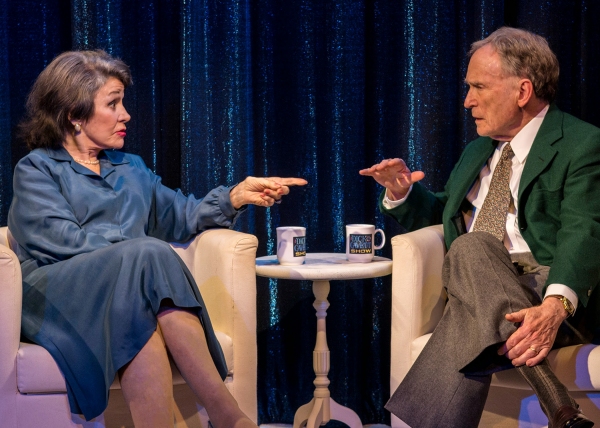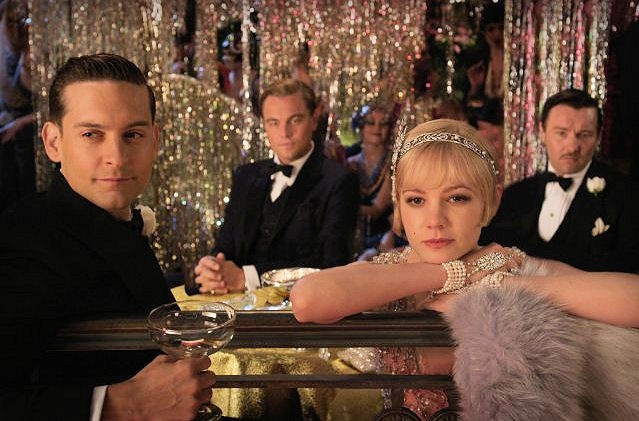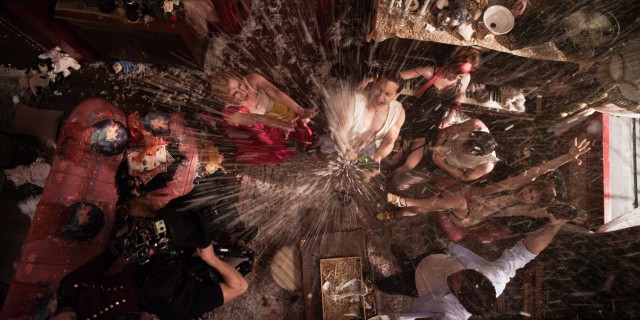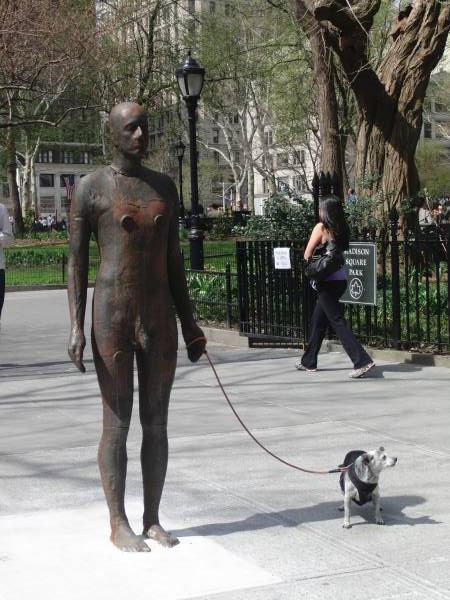
Mary McCarthy (Marcia Rodd) shares her blunt opinions with Dick Cavett in HELLMAN v. McCARTHY (photo by Kim T. Sharp)
June Havoc Theatre
Abingdon Theatre Arts Complex
312 West 36th St. between Eighth & Ninth Aves.
Wednesday – Sunday through April 13, $25
www.abingdontheatre.org
On October 18, 1979, one of the most dramatic literary feuds of the twentieth century kicked off on The Dick Cavett Show when writer and critic Mary McCarthy called Lillian Hellman a “dishonest writer,” explaining that “I said once in some interview that every word she writes is a lie, including ‘and’ and ‘the.’” An irate Hellman sued McCarthy, Cavett, and PBS for more than two million dollars, leading to a vitriolic back-and-forth between the writer of such works as The Children’s Hour, The Little Foxes, and Watch on the Rhine and the author of such books as The Company She Keeps, Memories of a Catholic Girlhood, and The Group — the last of which was made into a film starring, among others, Cavett’s wife, Carrie Nye. Various versions of the famous story have already been told onstage, by Nora Ephron in her musical, Imaginary Friends, Ben Pleasants in Contentious Minds: The Mary McCarthy, Lillian Hellman Affair, and William Wright in The Julia Wars. Now Brian Richard Mori is taking on this battle of literary bigs with a unique twist: The character of Dick Cavett is being played by, well, Dick Cavett himself, and Cavett is by far the best thing about the Abingdon Theatre’s otherwise doleful Hellman v. McCarthy. The proverbial gloves come off as soon as McCarthy (Marcia Rodd) calls Hellman (Roberta Maxwell) a liar; as it turns out, when the recorded show aired, Hellman was watching with her nurse, Ryan Hobbs (Rowan Michael Meyer), and she did not react well to McCarthy’s statement, immediately calling her attorney.

Lillian Hellman’s (Roberta Maxwell) nurse (Rowan Michael Meyer) jumps for joy upon meeting Dick Cavett (photo by Kim T. Sharp)
Hellman’s lawyer, Lester Marshall (Peter Brouwer), and McCarthy’s, Burt Fielding (Jeff Woodman), can’t get their clients to reach an agreement as the nasty words keep flying. “I’d rather eat my own vomit,” Hellman says when told by Marshall that they can read everything they want about McCarthy as part of discovery. “I refuse to make it easy for her,” McCarthy tells Fielding upon deciding to appeal. Ultimately, Mori has the two women go face-to-face at a meeting that never actually took place, continuing the nearly constant drone of unpleasantness at an even higher pitch as these two extremely unlikable women have it out. The only respite is the occasional appearance of Cavett to fill in some of the details and share his own thoughts on the matter; he is, as ever, witty, charming, and intellectual, although he does too many Woody Allen references. Abingdon artistic director Jan Buttram cuts between two primary sets designed by Andrew Lu: on the left side of the stage is a room in Hellman’s home on Martha’s Vineyard, while to the right is a room in McCarthy’s house in Castine, Maine. Virtually all the furniture is white, with empty picture frames, as if implying that neither of the women has any friends or family. Travis McHale’s lighting design turns the back walls various pastel shades of pink, green, and other colors, offering just about the only amiable visuals aside from Cavett’s appearances. Hellman v. McCarthy sheds no new light on the feud, instead letting two nasty souls blather on in nasty ways; the production probably would have been much better if it was simply a one-man show featuring Cavett.

 Baz Luhrmann’s sumptuous version of The Great Gatsby is a dazzling reimagining of F. Scott Fitzgerald’s 1925 novel of old and new money and the American dream. The Australian director and his wife, costume and production designer extraordinaire Catherine Martin, have turned the classic tale into a lush spectacle without losing focus on the main story of life and love during the Roaring Twenties. Leonardo DiCaprio, who played the male lead in Lurhmann’s contemporary take on Romeo + Juliet, is superb as Jay Gatsby, the mystery man previously portrayed by Warner Baxter in 1926, Alan Ladd in 1949, Robert Redford in 1974, and Toby Stephens in 2000, adding a compelling level of vulnerability to the character. Gatsby has built a magnificent palace for himself on Long Island, hosting wild parties that he doesn’t care about; all he truly wants is Daisy (Carey Mulligan), a former love who has married successful businessman Tom Buchanan (Joel Edgerton) and lives in a mansion right across the bay. The villainous Tom is having an affair with the lower-class Myrtle Wilson (Isla Fisher), whose unaware husband, George (Jason Clarke), runs a gas station and garage in the Valley of Ashes. Although a loner, Gatsby befriends his neighbor, Nick Carraway (Tobey Maguire), a young, innocent bond trader who rents a modest home at the base of Gatsby’s enormous estate and whose cousin just happens to be Daisy. As Carraway is sucked into this glamorous, debauched society, which also includes wild and elegant golf champion Jordan Baker (Elizabeth Debicki), he is forced to reexamine his own hopes and dreams as he tries to find his place in the world.
Baz Luhrmann’s sumptuous version of The Great Gatsby is a dazzling reimagining of F. Scott Fitzgerald’s 1925 novel of old and new money and the American dream. The Australian director and his wife, costume and production designer extraordinaire Catherine Martin, have turned the classic tale into a lush spectacle without losing focus on the main story of life and love during the Roaring Twenties. Leonardo DiCaprio, who played the male lead in Lurhmann’s contemporary take on Romeo + Juliet, is superb as Jay Gatsby, the mystery man previously portrayed by Warner Baxter in 1926, Alan Ladd in 1949, Robert Redford in 1974, and Toby Stephens in 2000, adding a compelling level of vulnerability to the character. Gatsby has built a magnificent palace for himself on Long Island, hosting wild parties that he doesn’t care about; all he truly wants is Daisy (Carey Mulligan), a former love who has married successful businessman Tom Buchanan (Joel Edgerton) and lives in a mansion right across the bay. The villainous Tom is having an affair with the lower-class Myrtle Wilson (Isla Fisher), whose unaware husband, George (Jason Clarke), runs a gas station and garage in the Valley of Ashes. Although a loner, Gatsby befriends his neighbor, Nick Carraway (Tobey Maguire), a young, innocent bond trader who rents a modest home at the base of Gatsby’s enormous estate and whose cousin just happens to be Daisy. As Carraway is sucked into this glamorous, debauched society, which also includes wild and elegant golf champion Jordan Baker (Elizabeth Debicki), he is forced to reexamine his own hopes and dreams as he tries to find his place in the world.




